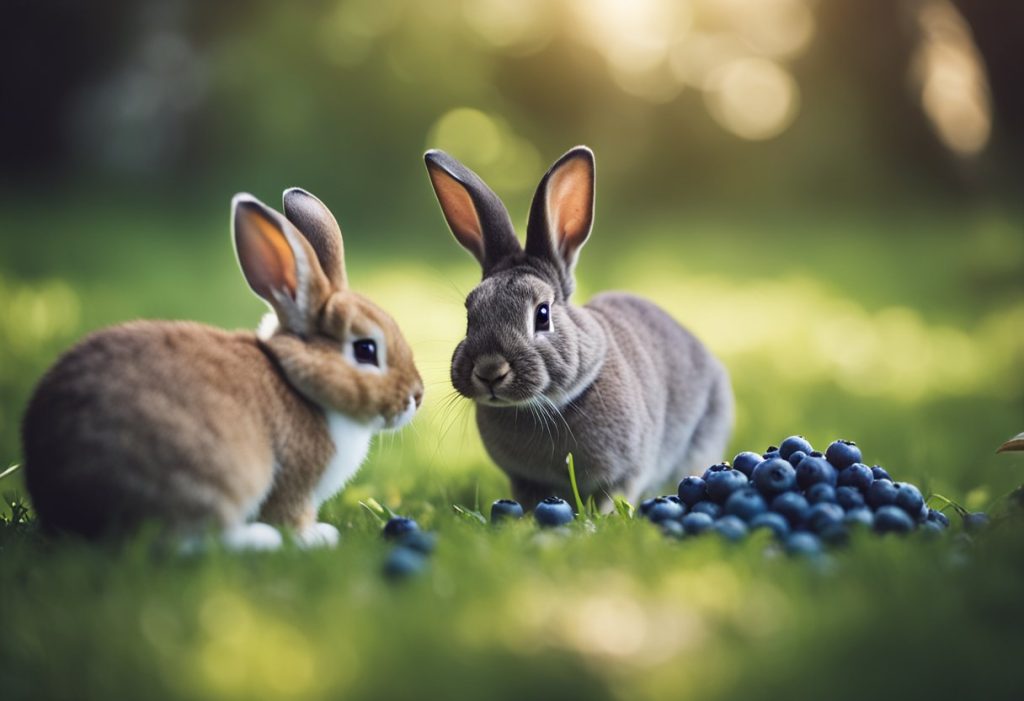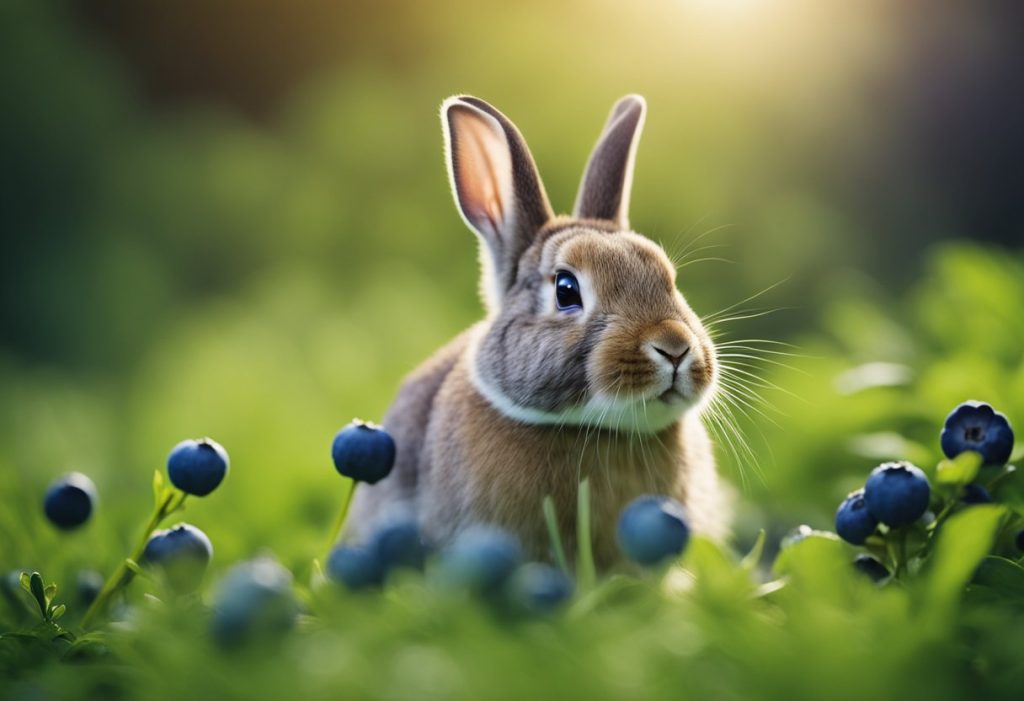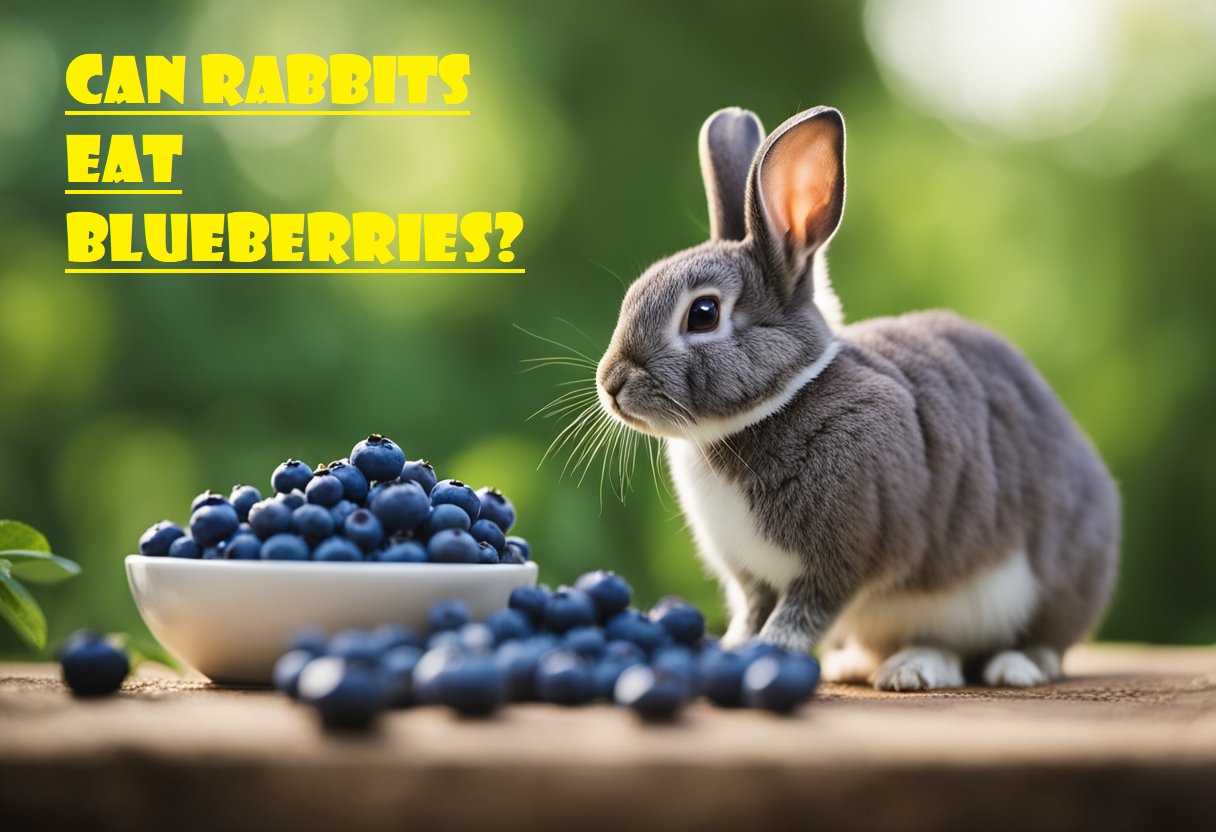Rabbits are adorable creatures that make great pets. However, as a pet owner, you must ensure your furry friend consumes a healthy and balanced diet. One question that rabbit owners often ask is whether rabbits can eat blueberries.
Blueberries are a popular fruit known for their high antioxidant levels and numerous health benefits for humans. However, when it comes to rabbits, it’s important to understand whether blueberries are safe for them to eat and the potential benefits or risks.
In this article, we will explore whether rabbits can eat blueberries. We will examine the nutritional value of blueberries for rabbits and whether they are safe for consumption. We will also examine how often rabbits can eat blueberries and the recommended quantity.
Can rabbits eat blueberries?
Rabbits can eat blueberries, which can be a healthy and tasty treat. Blueberries are a good source of vitamins and antioxidants, which can help boost a rabbit’s overall health. However, feeding blueberries to rabbits in moderation is important, as they are high in sugar and can cause digestive issues if fed in excess.
When feeding blueberries to rabbits, washing them thoroughly and removing any stems or leaves is important, as they can harm rabbits. Introducing blueberries slowly into a rabbit’s diet is also important, starting with a small amount and gradually increasing the portion size over time.
Here are some key points to keep in mind when feeding blueberries to rabbits:
- Blueberries should be considered a treat, not a staple, in a rabbit’s diet.
- Feeding blueberries to rabbits once or twice a week in small portions is recommended.
- Blueberries should be washed thoroughly, and any stems or leaves should be removed before feeding them to rabbits.
- If a rabbit experiences digestive issues after eating blueberries, it is important to reduce or eliminate their intake and consult a veterinarian if the issue persists.

Rabbit Diet Basics
Rabbits are herbivores and require a diet that is high in fiber to maintain good digestive health. A healthy rabbit diet should consist of hay, fresh vegetables, and a small amount of pellets.
Hay: Hay should make up the majority of a rabbit’s diet. Timothy hay is a good choice, as it is high in fiber and low in calories. Other hay types, such as orchard grass and meadow hay, can also be fed in moderation.
Vegetables: Fresh vegetables should comprise about 15-20% of a rabbit’s diet. Some good choices include leafy greens like kale, spinach, and romaine lettuce and vegetables like carrots, bell peppers, and cucumbers. Introducing new vegetables slowly and in small quantities is important to avoid digestive upset.
Pellets: Pellets should make up a small portion of a rabbit’s diet, at least 5%. Look for high-quality pellets high in fiber and low in protein and fat.
It is important to note that rabbits should only be fed fruits occasionally. While fruits like blueberries can be given as an occasional treat, they should not make up a significant portion of a rabbit’s diet.
Health Benefits of Blueberries for Rabbits
Blueberries are a great addition to a rabbit’s diet. They are packed with nutrients and antioxidants that help promote good health. Here are some of the health benefits of blueberries for rabbits:
Antioxidants and Nutrients
Blueberries are rich in antioxidants, which help protect the body from damage caused by free radicals. They contain important nutrients, including vitamins C, K, and E. These vitamins are important in maintaining overall health and supporting various bodily functions.
Digestive Health
Blueberries are a good source of fiber, essential for maintaining good digestive health in rabbits. Fiber helps keep the digestive system moving, preventing blockages and keeping the gut healthy. It also helps regulate blood sugar levels and can reduce the risk of obesity in rabbits.
Incorporating blueberries into a rabbit’s diet is easy. They can be offered as a treat or mixed with their regular food. However, it is important to remember that blueberries should be given in moderation, as too much fruit can upset a rabbit’s delicate digestive system. A small handful of blueberries once or twice a week is a good rule of thumb.
Blueberries are a healthy and delicious addition to a rabbit’s diet. They provide a range of important nutrients and antioxidants that can help promote good health and prevent disease.
Risks of Feeding Blueberries to Rabbits
While blueberries can be a healthy treat for rabbits when fed in moderation, there are some risks associated with feeding them to your furry friend. In this section, we will discuss some potential risks of feeding blueberries to rabbits.
Sugar Content Concerns
Blueberries are high in natural sugars, which can harm rabbits if consumed excessively. Overfeeding blueberries to your rabbit can lead to obesity, dental problems, and gastrointestinal issues. In addition, rabbits have a delicate digestive system, and consuming too much sugar can cause an imbalance in their gut flora, leading to diarrhea.
To avoid these issues, it is recommended that blueberries should only be fed to rabbits in small amounts as an occasional treat and should never make up a significant portion of their diet.
Potential Allergic Reactions
Some rabbits may have an allergic reaction to blueberries, which can cause symptoms such as itching, swelling, and respiratory distress. If your rabbit has never eaten blueberries before, it is recommended to introduce them slowly and in small amounts to monitor for any adverse reactions.
If your rabbit displays any signs of an allergic reaction after consuming blueberries, such as difficulty breathing or swelling of the face or mouth, seek veterinary attention immediately.
Overall, while blueberries can be a healthy and tasty treat for rabbits, it is important to feed them in moderation and monitor for potential adverse reactions. Following these guidelines, you can safely incorporate blueberries into your rabbit’s diet as a healthy and enjoyable snack.

Proper Serving Size for Rabbits
Rabbits can eat blueberries, but it is important to offer them in moderation. blueberries should be offered in a way that does not harm rabbits.
A general rule of thumb is to give no more than one teaspoon of blueberries per 2 pounds (0.9 kg) of the rabbit’s body weight. This is an occasional treat and should be different from the natural forage that makes up the bulk of their diet.
It is also important to note that blueberries contain sugar, so offering them in excess can lead to weight gain and other health problems. Rabbits should have a balanced diet that includes hay, fresh vegetables, and a limited amount of fruit.
To ensure that rabbits get the proper nutrition, it is recommended to consult a veterinarian specializing in exotic animals. They can guide rabbits’ diet and serving sizes for their needs.
In summary, while blueberries are safe for rabbits to eat, they should be offered in moderation as a treat and should not replace their regular diet.
Frequency of Feeding Blueberries
While blueberries are safe for rabbits to eat, it is important to remember that they should only be given as a treat, not as a regular part of their diet. A general rule of thumb is to give no more than one teaspoon of blueberries per 2 pounds (0.9 kg) of the rabbit’s body weight.
It is also important to note that blueberries should not replace the natural forage that makes up the bulk of a rabbit’s diet. Rabbits are herbivores whose digestive system is designed to break down fibrous foods like hay and grass. A diet high in sugar, like one that includes too many fruits, can lead to digestive issues like diarrhea and obesity.
In addition to blueberries, rabbits can enjoy a wide range of fruits and vegetables in moderation. Introducing new foods slowly and in small quantities is important to avoid upsetting their stomachs. Some safe fruits for rabbits include strawberries, raspberries, apples, and bananas. Safe vegetables include carrots, kale, and spinach.
Overall, when given in moderation, blueberries can be a healthy and tasty treat for rabbits. By following the guidelines for frequency of feeding and introducing new foods slowly, rabbit owners can ensure that their furry friends stay healthy and happy.
Incorporating Blueberries into a Rabbit’s Diet
Blueberries can be a healthy addition to a rabbit’s diet when fed in moderation. Blueberries are low in calories, fiber, and antioxidants, making them a nutritious snack for rabbits. However, as with any new food, it’s important to introduce blueberries slowly and in small quantities to avoid digestive upset.
When feeding blueberries to a rabbit, it’s important to wash them thoroughly and remove any stems or leaves. Rabbits should only be fed fresh, ripe blueberries, as unripe berries can be toxic. It’s also important to remember that blueberries should only be fed as a treat and not as a replacement for a rabbit’s regular diet of hay, fresh vegetables, and a small amount of pellets.
To incorporate blueberries into a rabbit’s diet, owners can offer them a few berries as a treat a few times a week. Alternatively, owners can mix a small amount of mashed blueberries into a rabbit’s regular food to introduce the new flavor. However, it’s important to monitor a rabbit’s reaction to blueberries and adjust the amount offered accordingly.
Alternative Healthy Treats for Rabbits
While blueberries are a great treat for rabbits, it is important to vary their diet to ensure they receive all the necessary nutrients. Here are some alternative healthy treats for rabbits that can be included in their diet:
Apples
Apples are a great source of fiber and vitamin C for rabbits. However, removing the seeds and core before feeding them to rabbits is important as they contain cyanide, which can harm rabbits.
Carrots
Carrots are a popular treat for rabbits and a great source of vitamin A. However, they should be given in moderation as they are high in sugar.
Strawberries
Strawberries are a good source of vitamin C and fiber for rabbits. They are also low in calories, making them a great treat option.
Kale
Kale is a nutritious leafy green vegetable rich in vitamins A, C, and K. It can be fed to rabbits in moderation as a treat.
Timothy Hay
Timothy hay is an important part of a rabbit’s diet and can be used as a treat. It is high in fiber and helps keep a rabbit’s digestive system healthy.
FAQs About Can Wild Rabbits Eat Blueberries
How many blueberries can I give my rabbit?
While blueberries are a healthy addition to a rabbit’s diet, moderation is key. A few blueberries a couple of times a week is generally safe. Too many can lead to digestive issues or an upset stomach due to the berries’ natural sugars and fiber content.
Should I wash blueberries before giving them to my rabbit?
Yes, washing blueberries thoroughly before offering them to your rabbit is advisable. This helps remove any pesticides, chemicals, or contaminants that may be present on the surface of the berries. Clean fruits contribute to the overall well-being of your rabbit.
Are there any parts of the blueberry that rabbits should avoid?
Generally, rabbits can eat the whole blueberry, including the skin. However, cutting or breaking the blueberries into smaller, bite-sized pieces is a good idea to prevent choking and aid in easier digestion. Remove any stems or leaves attached to the berries before offering them to your rabbit.
Can feeding blueberries be a substitute for a balanced rabbit diet?
Blueberries, or any other treats, should not replace the primary diet of hay, fresh vegetables, and high-quality rabbit pellets. These treats are meant to be occasional and given in small amounts. Most rabbit diets should contain hay to ensure proper nutrition and dental health.
Read More Related Post:https://petsapex.com/can-rabbits-eat-radishes/
Conclusion About Can Rabbit Eat Blueberries
In conclusion, blueberries can be a healthy and tasty treat for rabbits when fed in moderation and introduced slowly. With proper preparation and monitoring, blueberries can be a fun addition to a rabbit’s diet. It is important to note that treats should only make up a small part of a rabbit’s diet and be in moderation. Too many treats can lead to obesity and other health problems.

